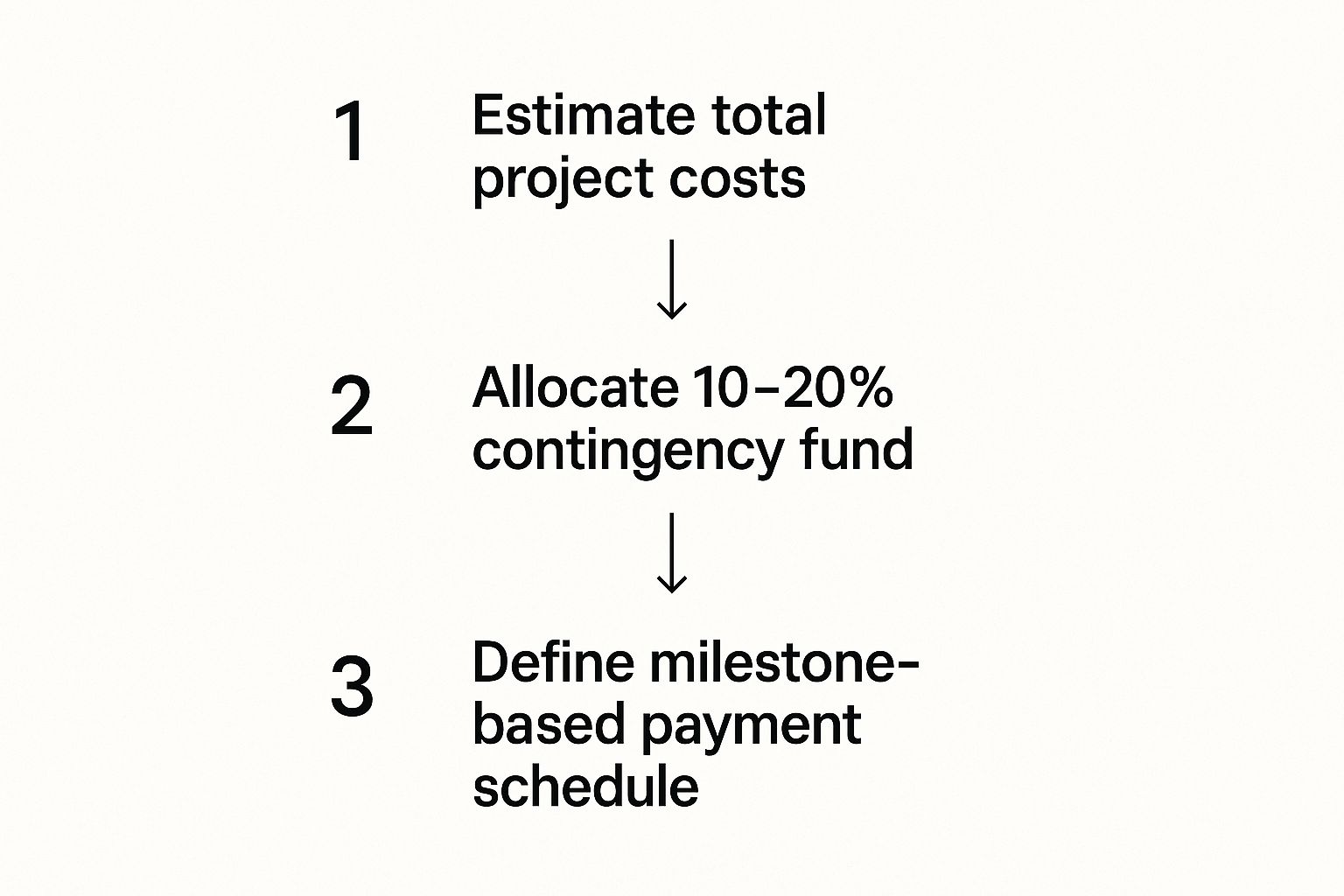
How to Choose a General Contractor: Expert Tips for Building Your Legacy
Picking the right general contractor isn’t just about hiring someone to swing a hammer; it’s about finding a genuine partner who will champion your vision. This is the person you’re trusting with your money, your timeline, and your dream. The whole process starts with building trust, long before the first shovel ever hits the dirt.
Your Search for the Right General Contractor Starts Here
Let’s be honest: choosing a general contractor is probably the single most important decision you’ll make for your project. Get it right, and the process can be a dream. Get it wrong? Well, that’s a nightmare you don’t even want to think about. This choice dictates everything—from your budget and schedule to the final quality of the work.
Forget just collecting bids and picking the cheapest one. That's a rookie mistake. You need a real strategy to figure out who has the chops to actually deliver.
Here's what you should be looking for:
- Credentials That Actually Mean Something: You need proof of stability and accountability. Look for certifications that show a company has been thoroughly vetted. For example, SEGC holds Native American-owned, 8(a), and HUBZone statuses. These aren't just fancy badges; they're a testament to our operational and financial strength, confirmed through a tough federal process.
- Deep Local Roots: A contractor who knows the local scene is worth their weight in gold. With over 21+ years of proven results in communities from Fayetteville to Lumberton, we’ve learned the ins and outs of local codes, built relationships with the best subcontractors, and understand the unique challenges of building in this region. That kind of local knowledge saves you time, money, and a lot of headaches.
- A Clear Grasp of Their Role: A great GC does way more than just manage a schedule. Before you sign anything, make sure you understand exactly what a general contractor does. This ensures their services truly match what your project demands.
At SEGC, we’ve always believed that a successful project is built on a foundation of absolute trust and crystal-clear communication. It’s not just about putting up a building; it’s about creating a legacy with a partner you can truly count on.
When all is said and done, you’re searching for a contractor who is just as invested in your project’s success as you are. This guide will give you the practical, no-nonsense advice you need to make a smart choice and find the right team to bring your vision to life.
Look Beyond the Bid to Uncover True Contractor Value
Getting a stack of bids is the easy part. The real work is figuring out what those numbers actually mean. It’s so tempting to grab the lowest bid and run, but believe me, that initial "savings" can quickly morph into a nightmare of cut-rate materials and surprise costs later on. Learning to read between the lines of a contractor's bid is the single most important skill for finding someone who delivers real value, not just a cheap price.
A detailed, transparent bid is a massive green flag. It tells you the contractor has actually thought through your project and isn't just throwing a number at the wall to see if it sticks. This document is your first real glimpse into their professionalism and how they'll communicate once the work starts.
Decoding the Details in a Bid
Stop thinking of a bid as just a price tag. It's the contractor's roadmap for your project. A solid bid will break everything down so you know exactly where your money is going.
Here’s what you should be looking for:
- Materials: Are specific brands, model numbers, and quantities listed? If you see vague terms like "standard fixtures" or "builder-grade flooring," push for specifics.
- Labor: How are they charging for their crew? A good bid will be clear about the rates for their team and any subcontractors involved.
- Subcontractors: Who are they bringing onto your property? A pro has a trusted network of skilled electricians, plumbers, and painters and won't be shy about sharing their credentials.
- Contingency and Fees: Are their management fees, profit margin, and contingency allowance clearly spelled out? Hiding these is a classic move of a less-than-reputable outfit.
We had a commercial project here in Fayetteville where our bid came in a little higher than two others. The client was sharp, though. He noticed our proposal had a detailed material list and even named our pre-vetted subcontractors. The cheaper bids were fuzzy on the details. He went with us and ended up dodging over $30,000 in potential change orders that would have been inevitable with the other guys.
Navigating Fluctuating Material Costs
The market for building materials has been a rollercoaster lately. It’s not just a headline; it's a real-world budget problem. For instance, the price of copper pipes shot up over 40% in just one year, and copper wire saw jumps between 14% and 17%. This kind of volatility can wreck a budget if your contractor isn't on top of their game. How they manage their supply chain is just as important as how they swing a hammer. You can get a better sense of how construction market trends affect project costs from industry leaders.
The lowest bid is often just a guess, not a guarantee. A truly valuable contractor gives you a realistic, comprehensive plan that shields your investment from market swings and nasty surprises.
This visual below lays out a simple framework for keeping your project's finances on solid ground.

This cycle—estimate, set aside a contingency, and tie payments to actual progress—is the bedrock of a financially sound project. At SEGC, our status as a Native American-owned, 8(a), and HUBZone certified firm isn't just a label. It means we're held to a higher standard of accountability and transparency. Our bids are built on integrity, not just numbers. After all, we’re here to build legacies, and that starts with an honest financial partnership from day one.
How to Vet a Contractor Like a Pro: Credentials and References
Let's be honest, a contractor's real resume isn't some slick document they hand you. It's the trail of finished projects and satisfied clients they leave behind. This is where you roll up your sleeves and do your homework—it's the single most important thing you can do to protect your investment. This isn't just about a quick peek at a license number; it's about getting a feel for how they really operate when things get tough.
Of course, you start with the absolute must-haves. Any contractor worth their salt will readily provide their state license number and full insurance docs, which means general liability and workers' compensation. Don't just take their word for it. Verify everything. This is your non-negotiable first step.

Go Beyond the Paperwork: Ask the Right Questions
Once the basics are confirmed, it's time to talk to their past clients. This is your backstage pass to see how they perform when the pressure is on. But please, don't just ask, "So, were you happy?" A simple 'yes' tells you next to nothing.
You need to dig deeper. Ask questions that paint a picture of their process and character.
- How did they communicate? "Walk me through how the project manager kept you in the loop. Was it daily texts, weekly calls? What happened when they needed a decision from you, like, right now?"
- What happens when things go wrong? "Every project hits a snag. Tell me about an unexpected issue that popped up. How did the team react, and what did they do to fix it?"
- Did they stick to the plan? "How close was the final bill to the initial estimate? When a change order came up, how was it explained and handled?"
- What was the crew like? "Tell me about the job site. Was it a disaster zone or kept tidy? Were the subcontractors professional and respectful of your space?"
These kinds of questions give you a story, not just a thumbs-up. For major projects, some people even turn to specialized reference verification services for an added layer of security.
"SEGC’s communication was flawless. When a supply delay threatened our timeline on our Lumberton project, they didn’t just bring us a problem; they came with three viable solutions. That’s the difference between a builder and a partner."
That’s what you’re listening for—a proactive problem-solver, not just a task-doer. At SEGC, our 21+ years of proven results and our Native American-owned, 8(a), and HUBZone certifications are all built on that kind of trust. We’re not just putting up buildings; we're building lasting relationships in the communities we call home.
Assessing a Contractor's Team and Resources
A general contractor might have the fanciest trucks and the shiniest tools, but their real strength is the people they bring to your job site. Think of a great GC as a master conductor leading an orchestra of skilled employees and trusted subcontractors. But what happens when the first-chair violin is a no-show? Your project grinds to a halt.
And this isn't some far-fetched scenario. The construction industry is scrambling to find around 439,000 new workers every single year just to tread water. A staggering 94% of firms are reporting headaches when trying to fill open positions. This isn't just a statistic; it's a direct threat to your project's timeline and quality. Asking the tough questions about a contractor’s team isn't just smart—it's essential.

Digging Into Their Core Team and Subcontractor Network
When you hire a general contractor, you’re not just hiring them. You’re hiring every single person they bring through your door. A stable, experienced team is one of the biggest green flags you can find, signaling a well-run company that actually values its people.
We've poured 21+ years into building not just a core team but a rock-solid network of local subcontractors right here in the Fayetteville and Lumberton areas. These aren't just random names we pulled from a hat; they are true craftsmen we've relied on for years.
Here’s what you need to uncover:
- Who’s running my show? Get names. Who is the project manager? The site superintendent? Are these full-time employees who live and breathe the company culture, or are they temporary hires?
- How do you pick your partners? A top-tier contractor has a bulletproof process for vetting their trade partners. They should be able to prove that every electrician, plumber, and painter is licensed, insured, and has a track record of excellence.
- Do people stick around? High turnover is a massive red flag. A revolving door means inconsistency. A company that invests in its people is far more likely to deliver consistent, high-quality work.
"A project schedule is only as strong as the team executing it. We maintain our timelines because we invest in our people and nurture long-term relationships with the best local trades. It's about building a reliable ecosystem, not just filling roles for a single job."
A Culture of Safety Isn't Optional
Ever walked onto a chaotic, messy job site? It isn't just dangerous; it's a glaring symptom of poor management that will eventually poison your project's quality and blow up the schedule. A contractor's commitment to safety says everything about their professionalism and attention to detail.
Don't be shy here. Ask for their safety record, specifically their Experience Modification Rate (EMR). Anything below 1.0 is solid. Getting a feel for their health and safety management practices for main contractors will give you a ton of insight into how they run their entire operation.
At the end of the day, a contractor who protects their team is a contractor who cares about every last detail of the job. It’s this deep-seated commitment—from people to process—that separates the good from the truly great.
Making Sense of the Construction Contract
Alright, let's talk about the paperwork. The contract is way more than just a legal hurdle; it's the actual game plan for your entire project and your relationship with the contractor. A solid, well-written agreement is a sign of a professional contractor—they want one because it keeps everyone honest and on the same page.
Think of it this way: the contract is the first thing you build together. It lays the foundation for trust. A vague phrase in a contract can snowball into a budget-busting nightmare, while a clearly defined clause can be the very thing that saves you from a massive headache later on. It’s all about getting everything out in the open from day one.

Key Clauses That Can Make or Break Your Project
Don't just give the contract a quick once-over. You need to put on your detective hat and dig into the details, especially the parts that control the money and the work. Every single line item matters.
Here are the non-negotiable sections you absolutely must understand before your pen ever touches that signature line:
- Scope of Work: This is the heart and soul of the agreement. It should read like a detailed to-do list for the entire project—every task, every brand of material, every single deliverable. If it's not in the scope of work, you can't assume it's getting done.
- Payment Schedule: This part is critical. It spells out who gets paid what and when. A good schedule ties payments to tangible progress—like the foundation being poured or the framing going up—not just random dates on a calendar. Be very wary of any contractor demanding a massive upfront payment.
- Change Order Process: Let’s be real, things change. Construction projects are dynamic. A good contract has a crystal-clear process for how you request, approve, and pay for any changes to the original plan. This is your defense against "scope creep" and surprise bills.
- Dispute Resolution: What happens if you and the contractor don't see eye to eye? This clause is your roadmap. It should outline a sensible process, like mediation, for resolving disagreements without having to immediately lawyer up and head to court.
A strong contract is basically the ultimate communication tool. It’s the one document that ensures you, your contractor, and everyone else involved is working from the same playbook and chasing the same goal.
Don't Sign Until You're Confident
Feeling a little intimidated by all the legal-speak? That's completely normal. But you don't need a law degree to protect your own interests. Taking the time to understand your agreement is one of the most powerful things you can do. It's worth learning how to read contracts effectively so you can walk into the deal with your eyes wide open.
Over our 21+ years of building across Fayetteville, Lumberton, and the surrounding areas, we've learned that a transparent contract is the true start of a successful project. As a Native American-owned, 8(a), and HUBZone certified firm, we hold ourselves to an incredibly high standard of accountability. For us, that begins with an honest, straightforward contract that protects everyone involved. It’s about building a relationship, not just a building.
How a Great Contractor Weathers the Storm
Let's be honest: your construction project isn't happening in a bubble. It's tied directly to the wild world of economic swings, tangled supply chains, and material costs that can change on a dime. Any decent contractor can react to these shifts. A truly great one sees them coming.
This is where you separate the pros from the rookies. Financial stability and a knack for strategic foresight are a seasoned firm's secret weapons. A contractor with deep roots and a solid balance sheet can ride out storms that would sink a less-prepared company. It’s not just about having cash in the bank; it’s about knowing how to manage risk. It means having the street smarts to order materials before prices spike or having the pull with suppliers to get what you need when everyone else is scrambling.
Turning Experience into Your Advantage
After 21+ years in this business, we've seen it all. We’ve navigated the booms, the busts, and everything in between, delivering for our clients in Fayetteville, Lumberton, and beyond. That long-term view is baked right into how we plan.
So, how do we pull it off? It comes down to a few core principles:
- We Play the Long Game with Suppliers: We don't just chase the cheapest price today. We build real, lasting partnerships, which means we get priority access and stable pricing, even when the market goes haywire.
- We Buy Smart: We keep a close eye on market trends, advising you on the best moments to lock in costs for key materials. This is one of the biggest ways we protect your budget from nasty surprises.
- Our Books are an Open Book: As an 8(a) and HUBZone-certified firm, our financial health is constantly under the microscope. That level of accountability means you can count on us to be a stable partner for the entire journey.
The construction world is buzzing right now. We're seeing U.S. construction spending blow past the $2 trillion mark, and the industry now employs a record 8.3 million people. While that's great news, it also creates fierce competition for labor and puts a squeeze on supplies. If you're curious about the bigger economic picture, Deloitte’s engineering and construction industry outlook offers some fantastic insights.
You don't judge a captain by how they sail in calm seas. A contractor's true worth shines when the unexpected hits. Their ability to navigate market turbulence is what ultimately protects your investment.
This forward-thinking approach is the bedrock of our reputation. As a Native American-owned company, we're grounded in a philosophy of long-term vision—we're here to build legacies, not just structures. When you work with us, you're getting a steady hand at the helm, ready to guide your project home, no matter what the market throws our way.
Got Questions? We've Got Answers
Even the most buttoned-up project plan comes with questions. It’s just part of the process. So, let's tackle some of the most common ones we hear from clients. Getting these answers straight will give you the confidence you need to move forward.
How Many Bids Should I Really Get?
The magic number is usually three to five. This gives you a solid range to compare without drowning in paperwork.
But here’s the real pro-tip: quantity is meaningless without quality. A stack of five bids is useless if they aren't all based on the exact same project scope and materials. Insist on a detailed, apples-to-apples comparison, or you'll be guessing at what you're actually paying for.
What Are The Biggest Red Flags To Look Out For?
Your gut feeling is a powerful tool, but here are some concrete warning signs that should have you running for the hills:
- The Super-Low Bid: If a price seems too good to be true, it absolutely is. It's often a sign of desperation, cut corners, or a "get the job now, add costs later" strategy.
- Cash-Up-Front Demands: A huge cash deposit request is a massive red flag. It can suggest financial instability or worse.
- Vague Answers & Poor Communication: If they can't give you a straight answer now or take days to return a call, imagine what it’ll be like once your project is underway and they have your money.
- No Proof of License or Insurance: This is non-negotiable. If they can't immediately provide current, valid documentation, end the conversation.
We’ve built a comprehensive list of probing questions you should ask every general contractor before signing a contract. It’s an essential tool for protecting your investment.
Why Do Local Experience and Certifications Matter So Much?
Think of it this way: a contractor with deep local roots, like our team has in Fayetteville and Lumberton, has an incredible home-field advantage. They know the permitting officials by name, understand the nuances of local codes, and have the best subcontractors on speed dial. It saves you time, money, and a world of headaches.
And those federal certifications like 8(a) and HUBZone? They aren't just fancy badges. They are proof of a grueling vetting process that speaks volumes about a company's financial health, track record, and operational integrity.
At SEGC, our 21+ years of proven results and our Native American-owned status are built on this very foundation. It’s about accountability. We’re not just building structures—we’re building legacies.
Ready to partner with a general contractor who values trust, transparency, and quality above all else? The team at South Eastern General Contractors is here to bring your vision to life. Let’s build your legacy together. Visit us online to start the conversation.



